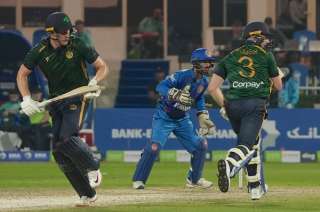

The O'Brien Press, 2007.
ISBN 978 1 84717 064 4
188pp, softback.
Price: £10.00
Ireland's qualification for the last eight of the World Cup in the West Indies opened up many eyes to the mere existence of the sport in Ireland. This is the story of how a special group of players came together to achieve international success.
Captain Trent Johnston and journalist Gerard Siggins trace the long and difficult journey Irish cricket had to make to reach the World Cup, as well as the story of Ireland's amazing victories of two of the world's top teams.- The amazing story of how cricket gripped the Irish public.
- Spectacular photographs of the amazing games that saw them reach the Super Eights.
- The real story, as it happened, from the Irish captain.
- Interviews with the team, other players, fans and Bob Woolmer.

It's hard to imagine a better story to tell than that of Ireland's epic exploits during the 2007 World Cup. It has everything: heroic efforts against the odds, a tie, the occasional anticlimax, and even a suspicious, possibly violent death, all against fabulous tropical backdrops. Agatha Christie couldn't have invented anything more absorbing.
As captain of the Irish side, Trent Johnston is well placed to give us an inside version, while Ger Siggins is among the small but dedicated band of Irish cricket journalists, and was with the squad throughout their campaign. Raiders of the Caribbean has everything going for it.
Up to a point, it lives up to expectations. As a record of a remarkable sporting adventure, it should be on the bookshelves of every enthusiast for Associates cricket. And yet in some ways it disappoints.
The book is jointly rather than co-written, in that the authors have evidently contributed alternate chapters, Johnston concentrating mainly on the cricket and Siggins giving more emphasis to the context.
This is logical enough, but it does have its disadvantages. There is, inevitably, a certain amount of duplication (as when we are told twice about Johnston's poor treatment by some of his team-mates when he was playing club cricket in London), and there are occasional inconsistencies. Steve Rixon, for example, appears both as the man responsible for Johnston's coming to Ireland and as the terminator of his Australian first-class career - both are no doubt true, and are probably connected, but this is one of the places where the book could have benefited from some careful copy-editing.
The division of labour has another down-side as well: Johnston is a modest narrator, and his own efforts don't always get the prominence they deserve. This is his version of the superb running catch he took to dismiss Pakistan's Kamran Akmal: ‘Akmal … mistimed a hook shot, which I somehow managed to clutch running back and diving to my left'.
The Pakistan game is, rightly, the only one which both authors describe in detail, but Johnston's magnificent effort doesn't make it into the Siggins account. It's a pity, because that catch was in many ways a microcosm, both of the Irish side's total commitment and of the skipper's outstanding contribution, both on and off the field.
Johnston is generous as well as modest, and he gives full credit to his team-mates, and above all to the inspiration of coach Adrian Birrell. Both authors, moreover, bring out just how much strength the players derived from the support of their wives and girlfriends, and of the Irish fans who followed their exploits.
It's not a book that goes seeking controversy, and Siggins's account of the death of Bob Woolmer and its aftermath (entitled ‘The Murder that Wasn't') is cautious and judicious. Johnston's version, revealing the players' grief and astonishment, balances that more factual version.
Elsewhere, there are hints of the larger issues which run through the politics of international cricket: the way the Zimbabweans commandeered the home dressing room in Jamaica which should in theory have been occupied by the Irish, the British press corps' obsession with the expatriates in the Irish squad (oh, the irony!), the negative attitude of some of the television commentary team.
None of these questions is developed - and neither is the thorny problem of the availability of English-based players for Ireland's international matches - but the signs are clear enough for those who read between the lines.
Raiders of the Caribbean, then, is a bit of a curate's egg, but for those who were stirred by Ireland's achievements it provides an opportunity to relive something of those extraordinary seven weeks.




